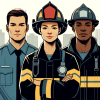Sometimes emotion and ego get in the way of changing the unrewarding decision and course we are traveling, and we keep on trucking and digging a deeper hole. In essence, we “cut off our nose to spite our face.”
There are those who rationalize poor behavior, saying it it wasn’t their fault. Examples of this is the firefighter who fails a promotional exam, then blames the exam maker, or says the department has it out for him or her. How about the lazy firefighter who comes to work to rest or to just do the bare minimum? This person rationalizes this behavior in their mind and lets us all know about it. Most of us will just listen and not challenge the unacceptable rational of the complaining firefighter. People of character will not let this rationalization slide. Organizations of character would also not let this behavior go unnoticed.
This is such a vital point. Everywhere we see evidence that we’re becoming a nation of unaccountable victims, whiners, and wimps all too ready to pass off responsibility to someone else.
Satirist Ambrose Bierce poked fun at this tendency when he defined responsibility as “a detachable burden easily shifted to the shoulders of God, Fate, Fortune, Luck, or one’s neighbor.” The parade of recently indicted CEOs added a new object of blame to this list (“It was the people who worked for me!”) as they claimed to be victims rather than perpetrators of frauds that enriched them.
Everywhere we turn, we see people blaming personal shortcomings and social ills on circumstances beyond their control, or on an irresponsible media, greedy businessmen, corrupt politicians, irresistible economic pressures, and every manner of psychological syndrome —- even on poor fire department leadership.
The bottom line is each of us can be as ethical with our decisions as we are willing to be. We need to think about our decisions in terms of simply right or wrong, how it impacts relationships, our credibility and our reputation.
Scenario
You are a captain working overtime at a slow station. You are not familiar with the district and would like to take a drive around the area. Your senior engineer is not happy with your decision to drive around the district and is very willing to let you and the other crew members know about his unhappiness.
You decide to go anyway. During your drive, the engineer embarks on a never ending dialog regarding the past, recent, and continuing mistakes the department administration has made. His dislike for his battalion chief and most chief officers is obvious. He informs you that he has taken a couple of promotional exams for the captain’s position and has not done well. He blames this failure on anything he can think about but himself.
What would you do, if anything, as the company officer to end the engineer’s bitter dissertation on the ills of the department?
Let us know your thoughts.


